History and Importance of Marine Insurance Incidents
VerifiedAdded on 2023/04/20
|11
|2989
|436
AI Summary
This article explores the history and importance of marine insurance incidents and their impact on business, country, and economy. It also discusses environmental issues related to marine insurance and the role of government and laws in Australia.
Contribute Materials
Your contribution can guide someone’s learning journey. Share your
documents today.
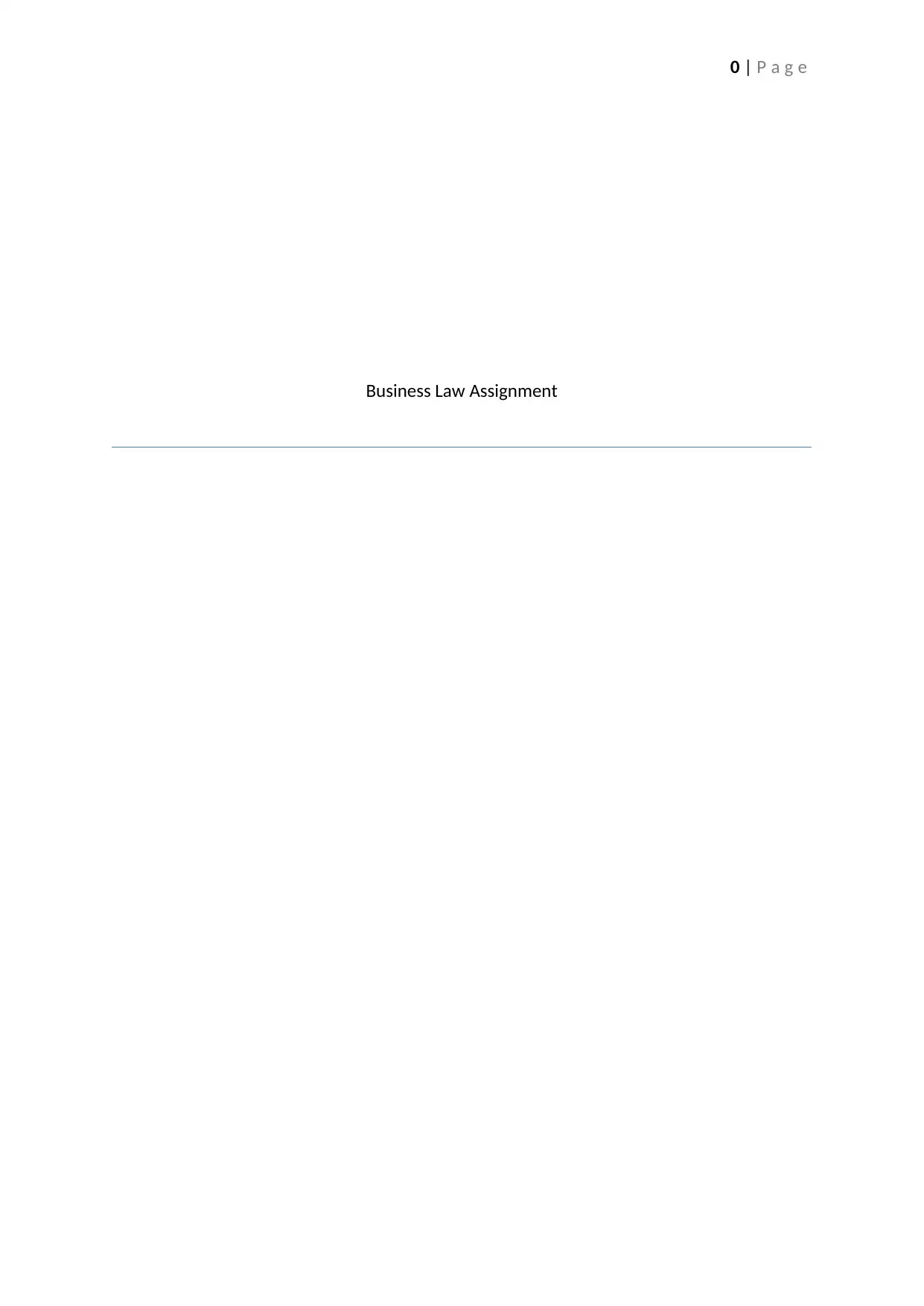
0 | P a g e
Business Law Assignment
Business Law Assignment
Secure Best Marks with AI Grader
Need help grading? Try our AI Grader for instant feedback on your assignments.
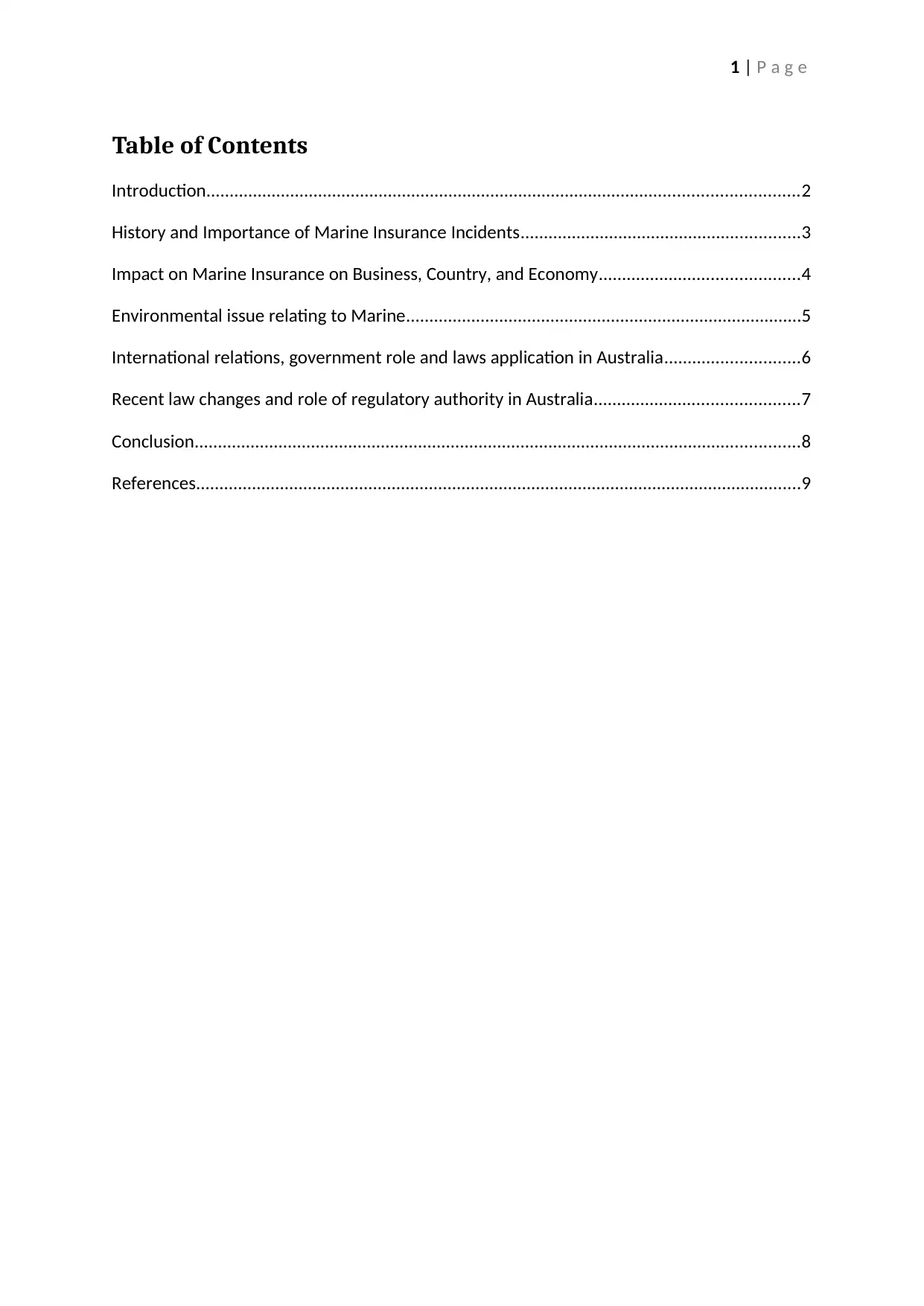
1 | P a g e
Table of Contents
Introduction...............................................................................................................................2
History and Importance of Marine Insurance Incidents............................................................3
Impact on Marine Insurance on Business, Country, and Economy...........................................4
Environmental issue relating to Marine.....................................................................................5
International relations, government role and laws application in Australia.............................6
Recent law changes and role of regulatory authority in Australia............................................7
Conclusion..................................................................................................................................8
References..................................................................................................................................9
Table of Contents
Introduction...............................................................................................................................2
History and Importance of Marine Insurance Incidents............................................................3
Impact on Marine Insurance on Business, Country, and Economy...........................................4
Environmental issue relating to Marine.....................................................................................5
International relations, government role and laws application in Australia.............................6
Recent law changes and role of regulatory authority in Australia............................................7
Conclusion..................................................................................................................................8
References..................................................................................................................................9
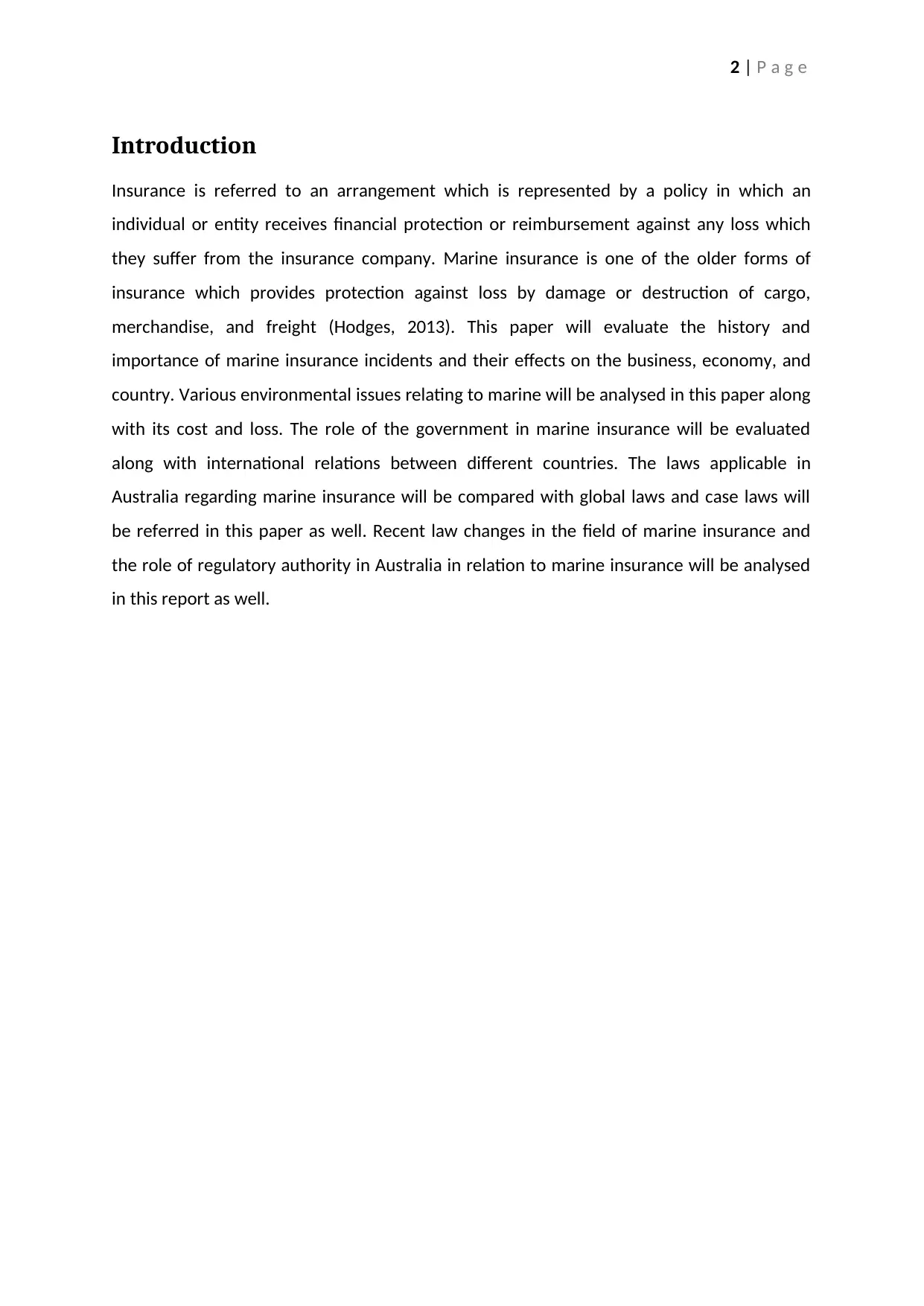
2 | P a g e
Introduction
Insurance is referred to an arrangement which is represented by a policy in which an
individual or entity receives financial protection or reimbursement against any loss which
they suffer from the insurance company. Marine insurance is one of the older forms of
insurance which provides protection against loss by damage or destruction of cargo,
merchandise, and freight (Hodges, 2013). This paper will evaluate the history and
importance of marine insurance incidents and their effects on the business, economy, and
country. Various environmental issues relating to marine will be analysed in this paper along
with its cost and loss. The role of the government in marine insurance will be evaluated
along with international relations between different countries. The laws applicable in
Australia regarding marine insurance will be compared with global laws and case laws will
be referred in this paper as well. Recent law changes in the field of marine insurance and
the role of regulatory authority in Australia in relation to marine insurance will be analysed
in this report as well.
Introduction
Insurance is referred to an arrangement which is represented by a policy in which an
individual or entity receives financial protection or reimbursement against any loss which
they suffer from the insurance company. Marine insurance is one of the older forms of
insurance which provides protection against loss by damage or destruction of cargo,
merchandise, and freight (Hodges, 2013). This paper will evaluate the history and
importance of marine insurance incidents and their effects on the business, economy, and
country. Various environmental issues relating to marine will be analysed in this paper along
with its cost and loss. The role of the government in marine insurance will be evaluated
along with international relations between different countries. The laws applicable in
Australia regarding marine insurance will be compared with global laws and case laws will
be referred in this paper as well. Recent law changes in the field of marine insurance and
the role of regulatory authority in Australia in relation to marine insurance will be analysed
in this report as well.
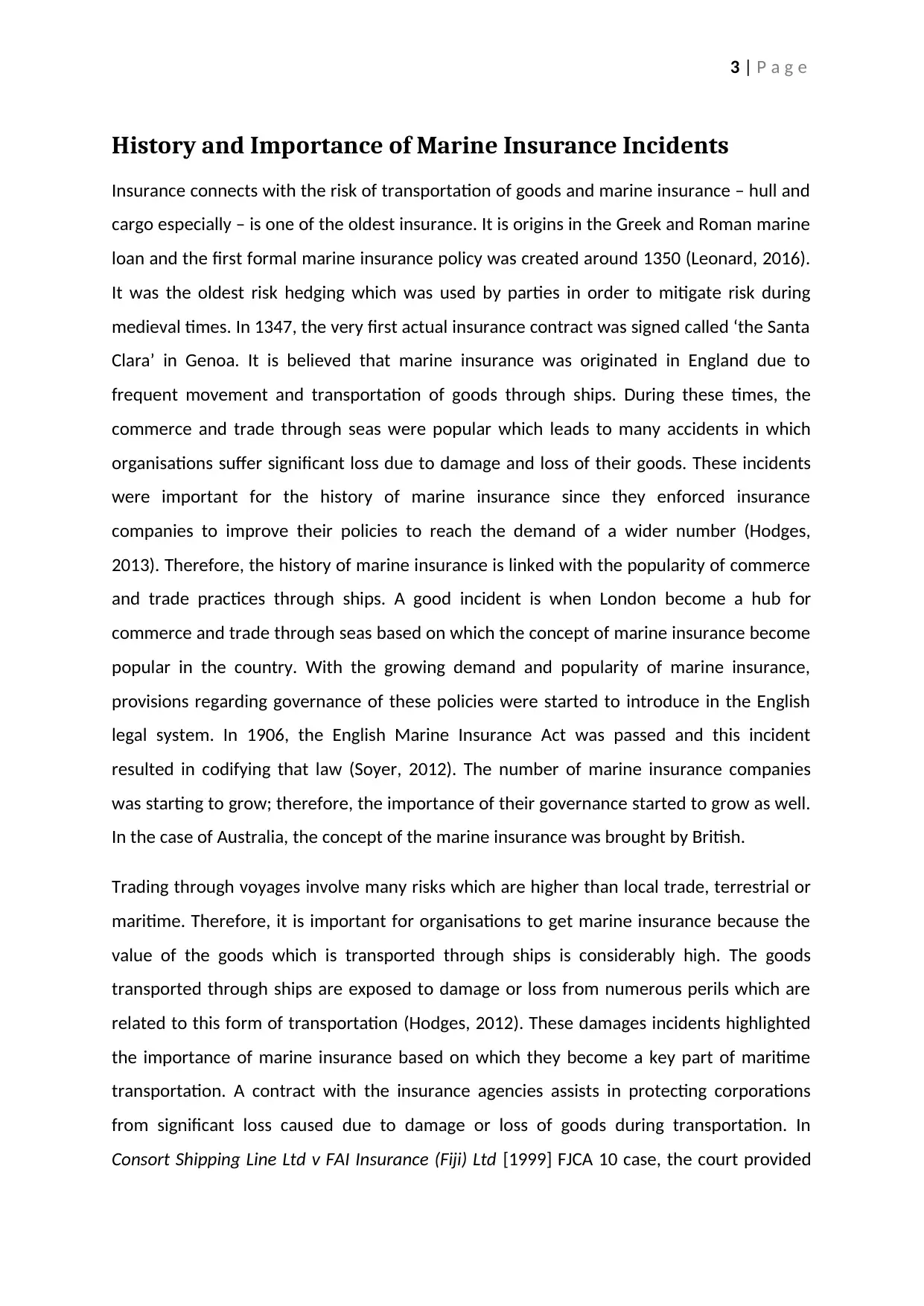
3 | P a g e
History and Importance of Marine Insurance Incidents
Insurance connects with the risk of transportation of goods and marine insurance – hull and
cargo especially – is one of the oldest insurance. It is origins in the Greek and Roman marine
loan and the first formal marine insurance policy was created around 1350 (Leonard, 2016).
It was the oldest risk hedging which was used by parties in order to mitigate risk during
medieval times. In 1347, the very first actual insurance contract was signed called ‘the Santa
Clara’ in Genoa. It is believed that marine insurance was originated in England due to
frequent movement and transportation of goods through ships. During these times, the
commerce and trade through seas were popular which leads to many accidents in which
organisations suffer significant loss due to damage and loss of their goods. These incidents
were important for the history of marine insurance since they enforced insurance
companies to improve their policies to reach the demand of a wider number (Hodges,
2013). Therefore, the history of marine insurance is linked with the popularity of commerce
and trade practices through ships. A good incident is when London become a hub for
commerce and trade through seas based on which the concept of marine insurance become
popular in the country. With the growing demand and popularity of marine insurance,
provisions regarding governance of these policies were started to introduce in the English
legal system. In 1906, the English Marine Insurance Act was passed and this incident
resulted in codifying that law (Soyer, 2012). The number of marine insurance companies
was starting to grow; therefore, the importance of their governance started to grow as well.
In the case of Australia, the concept of the marine insurance was brought by British.
Trading through voyages involve many risks which are higher than local trade, terrestrial or
maritime. Therefore, it is important for organisations to get marine insurance because the
value of the goods which is transported through ships is considerably high. The goods
transported through ships are exposed to damage or loss from numerous perils which are
related to this form of transportation (Hodges, 2012). These damages incidents highlighted
the importance of marine insurance based on which they become a key part of maritime
transportation. A contract with the insurance agencies assists in protecting corporations
from significant loss caused due to damage or loss of goods during transportation. In
Consort Shipping Line Ltd v FAI Insurance (Fiji) Ltd [1999] FJCA 10 case, the court provided
History and Importance of Marine Insurance Incidents
Insurance connects with the risk of transportation of goods and marine insurance – hull and
cargo especially – is one of the oldest insurance. It is origins in the Greek and Roman marine
loan and the first formal marine insurance policy was created around 1350 (Leonard, 2016).
It was the oldest risk hedging which was used by parties in order to mitigate risk during
medieval times. In 1347, the very first actual insurance contract was signed called ‘the Santa
Clara’ in Genoa. It is believed that marine insurance was originated in England due to
frequent movement and transportation of goods through ships. During these times, the
commerce and trade through seas were popular which leads to many accidents in which
organisations suffer significant loss due to damage and loss of their goods. These incidents
were important for the history of marine insurance since they enforced insurance
companies to improve their policies to reach the demand of a wider number (Hodges,
2013). Therefore, the history of marine insurance is linked with the popularity of commerce
and trade practices through ships. A good incident is when London become a hub for
commerce and trade through seas based on which the concept of marine insurance become
popular in the country. With the growing demand and popularity of marine insurance,
provisions regarding governance of these policies were started to introduce in the English
legal system. In 1906, the English Marine Insurance Act was passed and this incident
resulted in codifying that law (Soyer, 2012). The number of marine insurance companies
was starting to grow; therefore, the importance of their governance started to grow as well.
In the case of Australia, the concept of the marine insurance was brought by British.
Trading through voyages involve many risks which are higher than local trade, terrestrial or
maritime. Therefore, it is important for organisations to get marine insurance because the
value of the goods which is transported through ships is considerably high. The goods
transported through ships are exposed to damage or loss from numerous perils which are
related to this form of transportation (Hodges, 2012). These damages incidents highlighted
the importance of marine insurance based on which they become a key part of maritime
transportation. A contract with the insurance agencies assists in protecting corporations
from significant loss caused due to damage or loss of goods during transportation. In
Consort Shipping Line Ltd v FAI Insurance (Fiji) Ltd [1999] FJCA 10 case, the court provided
Secure Best Marks with AI Grader
Need help grading? Try our AI Grader for instant feedback on your assignments.
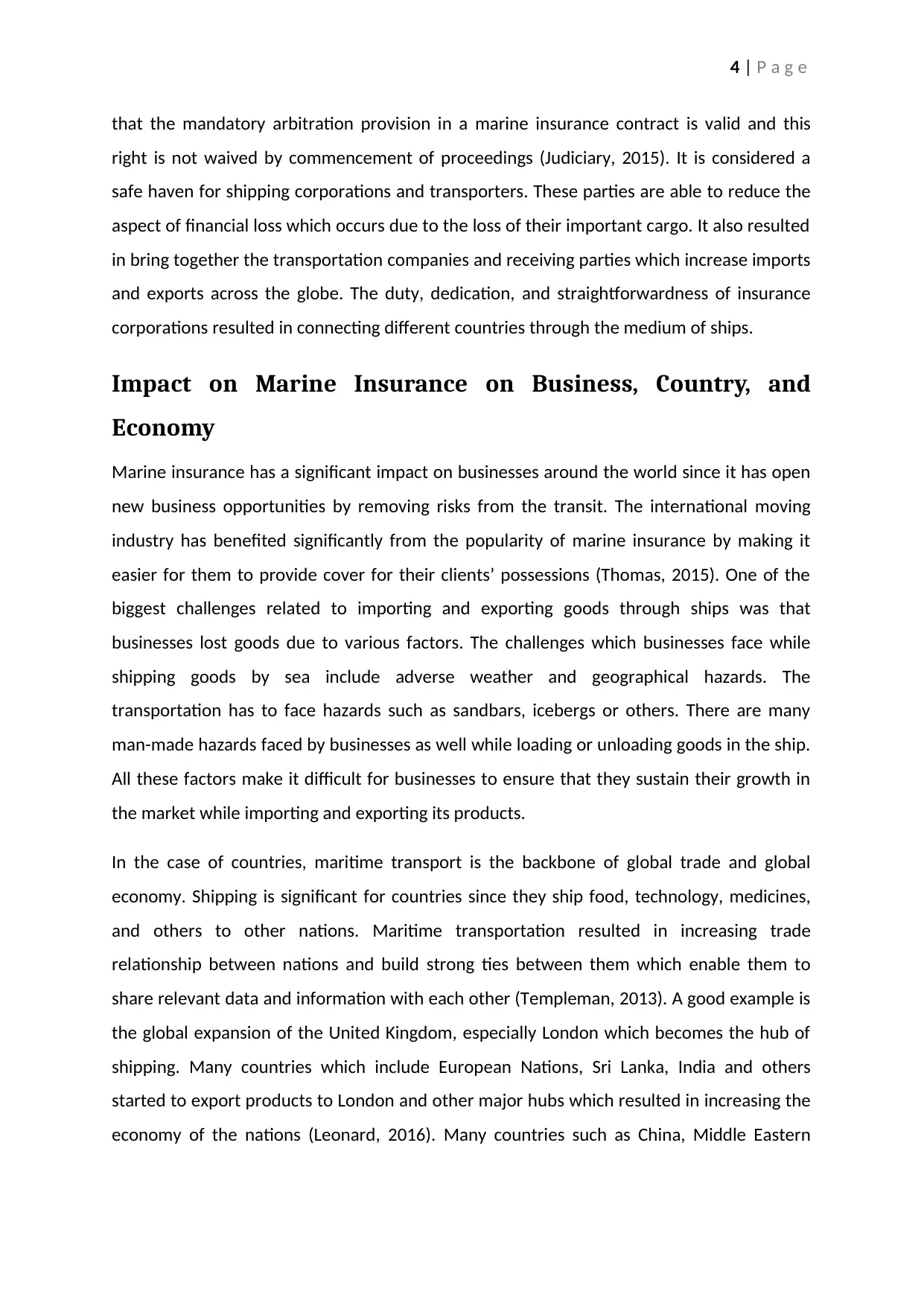
4 | P a g e
that the mandatory arbitration provision in a marine insurance contract is valid and this
right is not waived by commencement of proceedings (Judiciary, 2015). It is considered a
safe haven for shipping corporations and transporters. These parties are able to reduce the
aspect of financial loss which occurs due to the loss of their important cargo. It also resulted
in bring together the transportation companies and receiving parties which increase imports
and exports across the globe. The duty, dedication, and straightforwardness of insurance
corporations resulted in connecting different countries through the medium of ships.
Impact on Marine Insurance on Business, Country, and
Economy
Marine insurance has a significant impact on businesses around the world since it has open
new business opportunities by removing risks from the transit. The international moving
industry has benefited significantly from the popularity of marine insurance by making it
easier for them to provide cover for their clients’ possessions (Thomas, 2015). One of the
biggest challenges related to importing and exporting goods through ships was that
businesses lost goods due to various factors. The challenges which businesses face while
shipping goods by sea include adverse weather and geographical hazards. The
transportation has to face hazards such as sandbars, icebergs or others. There are many
man-made hazards faced by businesses as well while loading or unloading goods in the ship.
All these factors make it difficult for businesses to ensure that they sustain their growth in
the market while importing and exporting its products.
In the case of countries, maritime transport is the backbone of global trade and global
economy. Shipping is significant for countries since they ship food, technology, medicines,
and others to other nations. Maritime transportation resulted in increasing trade
relationship between nations and build strong ties between them which enable them to
share relevant data and information with each other (Templeman, 2013). A good example is
the global expansion of the United Kingdom, especially London which becomes the hub of
shipping. Many countries which include European Nations, Sri Lanka, India and others
started to export products to London and other major hubs which resulted in increasing the
economy of the nations (Leonard, 2016). Many countries such as China, Middle Eastern
that the mandatory arbitration provision in a marine insurance contract is valid and this
right is not waived by commencement of proceedings (Judiciary, 2015). It is considered a
safe haven for shipping corporations and transporters. These parties are able to reduce the
aspect of financial loss which occurs due to the loss of their important cargo. It also resulted
in bring together the transportation companies and receiving parties which increase imports
and exports across the globe. The duty, dedication, and straightforwardness of insurance
corporations resulted in connecting different countries through the medium of ships.
Impact on Marine Insurance on Business, Country, and
Economy
Marine insurance has a significant impact on businesses around the world since it has open
new business opportunities by removing risks from the transit. The international moving
industry has benefited significantly from the popularity of marine insurance by making it
easier for them to provide cover for their clients’ possessions (Thomas, 2015). One of the
biggest challenges related to importing and exporting goods through ships was that
businesses lost goods due to various factors. The challenges which businesses face while
shipping goods by sea include adverse weather and geographical hazards. The
transportation has to face hazards such as sandbars, icebergs or others. There are many
man-made hazards faced by businesses as well while loading or unloading goods in the ship.
All these factors make it difficult for businesses to ensure that they sustain their growth in
the market while importing and exporting its products.
In the case of countries, maritime transport is the backbone of global trade and global
economy. Shipping is significant for countries since they ship food, technology, medicines,
and others to other nations. Maritime transportation resulted in increasing trade
relationship between nations and build strong ties between them which enable them to
share relevant data and information with each other (Templeman, 2013). A good example is
the global expansion of the United Kingdom, especially London which becomes the hub of
shipping. Many countries which include European Nations, Sri Lanka, India and others
started to export products to London and other major hubs which resulted in increasing the
economy of the nations (Leonard, 2016). Many countries such as China, Middle Eastern
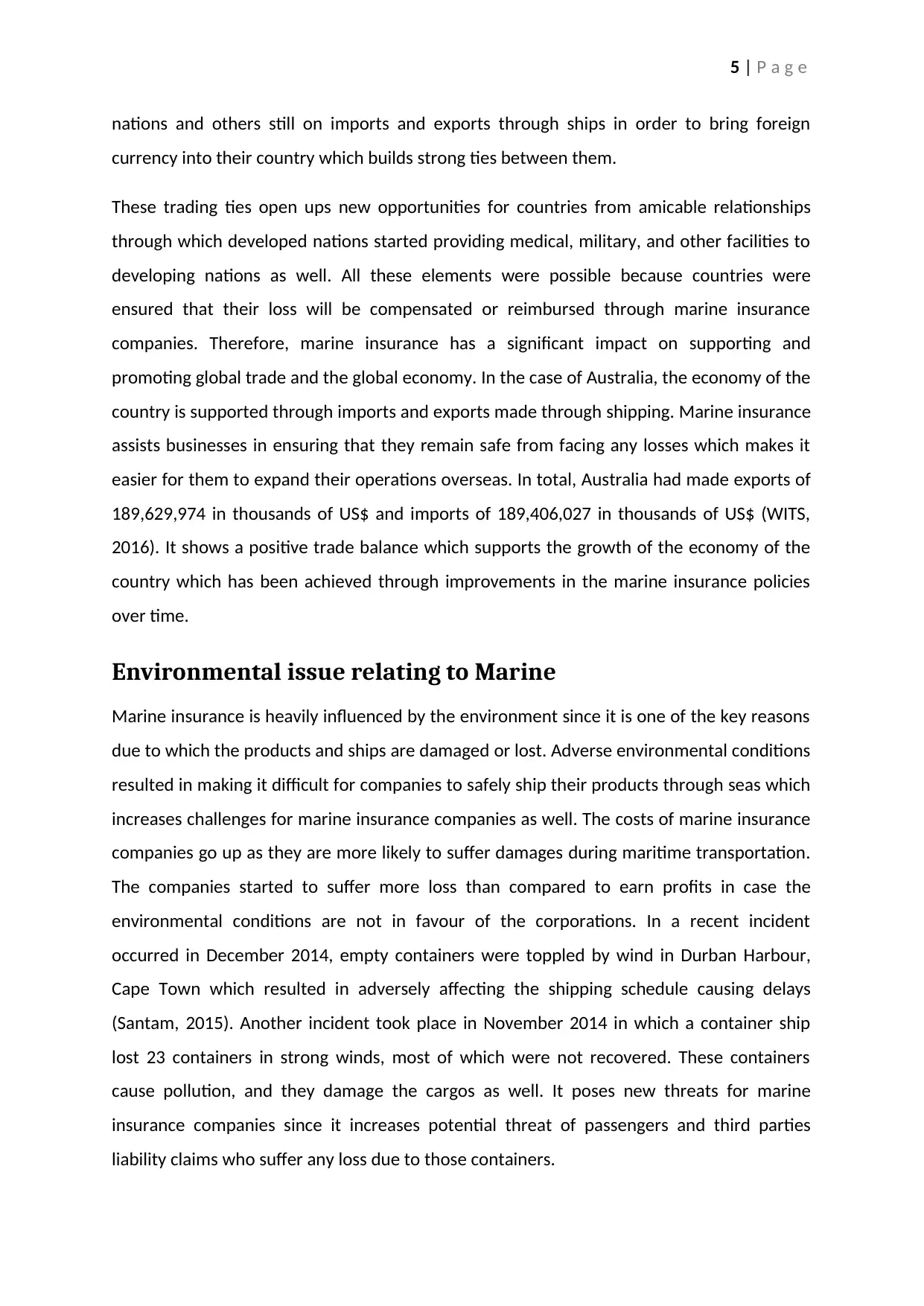
5 | P a g e
nations and others still on imports and exports through ships in order to bring foreign
currency into their country which builds strong ties between them.
These trading ties open ups new opportunities for countries from amicable relationships
through which developed nations started providing medical, military, and other facilities to
developing nations as well. All these elements were possible because countries were
ensured that their loss will be compensated or reimbursed through marine insurance
companies. Therefore, marine insurance has a significant impact on supporting and
promoting global trade and the global economy. In the case of Australia, the economy of the
country is supported through imports and exports made through shipping. Marine insurance
assists businesses in ensuring that they remain safe from facing any losses which makes it
easier for them to expand their operations overseas. In total, Australia had made exports of
189,629,974 in thousands of US$ and imports of 189,406,027 in thousands of US$ (WITS,
2016). It shows a positive trade balance which supports the growth of the economy of the
country which has been achieved through improvements in the marine insurance policies
over time.
Environmental issue relating to Marine
Marine insurance is heavily influenced by the environment since it is one of the key reasons
due to which the products and ships are damaged or lost. Adverse environmental conditions
resulted in making it difficult for companies to safely ship their products through seas which
increases challenges for marine insurance companies as well. The costs of marine insurance
companies go up as they are more likely to suffer damages during maritime transportation.
The companies started to suffer more loss than compared to earn profits in case the
environmental conditions are not in favour of the corporations. In a recent incident
occurred in December 2014, empty containers were toppled by wind in Durban Harbour,
Cape Town which resulted in adversely affecting the shipping schedule causing delays
(Santam, 2015). Another incident took place in November 2014 in which a container ship
lost 23 containers in strong winds, most of which were not recovered. These containers
cause pollution, and they damage the cargos as well. It poses new threats for marine
insurance companies since it increases potential threat of passengers and third parties
liability claims who suffer any loss due to those containers.
nations and others still on imports and exports through ships in order to bring foreign
currency into their country which builds strong ties between them.
These trading ties open ups new opportunities for countries from amicable relationships
through which developed nations started providing medical, military, and other facilities to
developing nations as well. All these elements were possible because countries were
ensured that their loss will be compensated or reimbursed through marine insurance
companies. Therefore, marine insurance has a significant impact on supporting and
promoting global trade and the global economy. In the case of Australia, the economy of the
country is supported through imports and exports made through shipping. Marine insurance
assists businesses in ensuring that they remain safe from facing any losses which makes it
easier for them to expand their operations overseas. In total, Australia had made exports of
189,629,974 in thousands of US$ and imports of 189,406,027 in thousands of US$ (WITS,
2016). It shows a positive trade balance which supports the growth of the economy of the
country which has been achieved through improvements in the marine insurance policies
over time.
Environmental issue relating to Marine
Marine insurance is heavily influenced by the environment since it is one of the key reasons
due to which the products and ships are damaged or lost. Adverse environmental conditions
resulted in making it difficult for companies to safely ship their products through seas which
increases challenges for marine insurance companies as well. The costs of marine insurance
companies go up as they are more likely to suffer damages during maritime transportation.
The companies started to suffer more loss than compared to earn profits in case the
environmental conditions are not in favour of the corporations. In a recent incident
occurred in December 2014, empty containers were toppled by wind in Durban Harbour,
Cape Town which resulted in adversely affecting the shipping schedule causing delays
(Santam, 2015). Another incident took place in November 2014 in which a container ship
lost 23 containers in strong winds, most of which were not recovered. These containers
cause pollution, and they damage the cargos as well. It poses new threats for marine
insurance companies since it increases potential threat of passengers and third parties
liability claims who suffer any loss due to those containers.
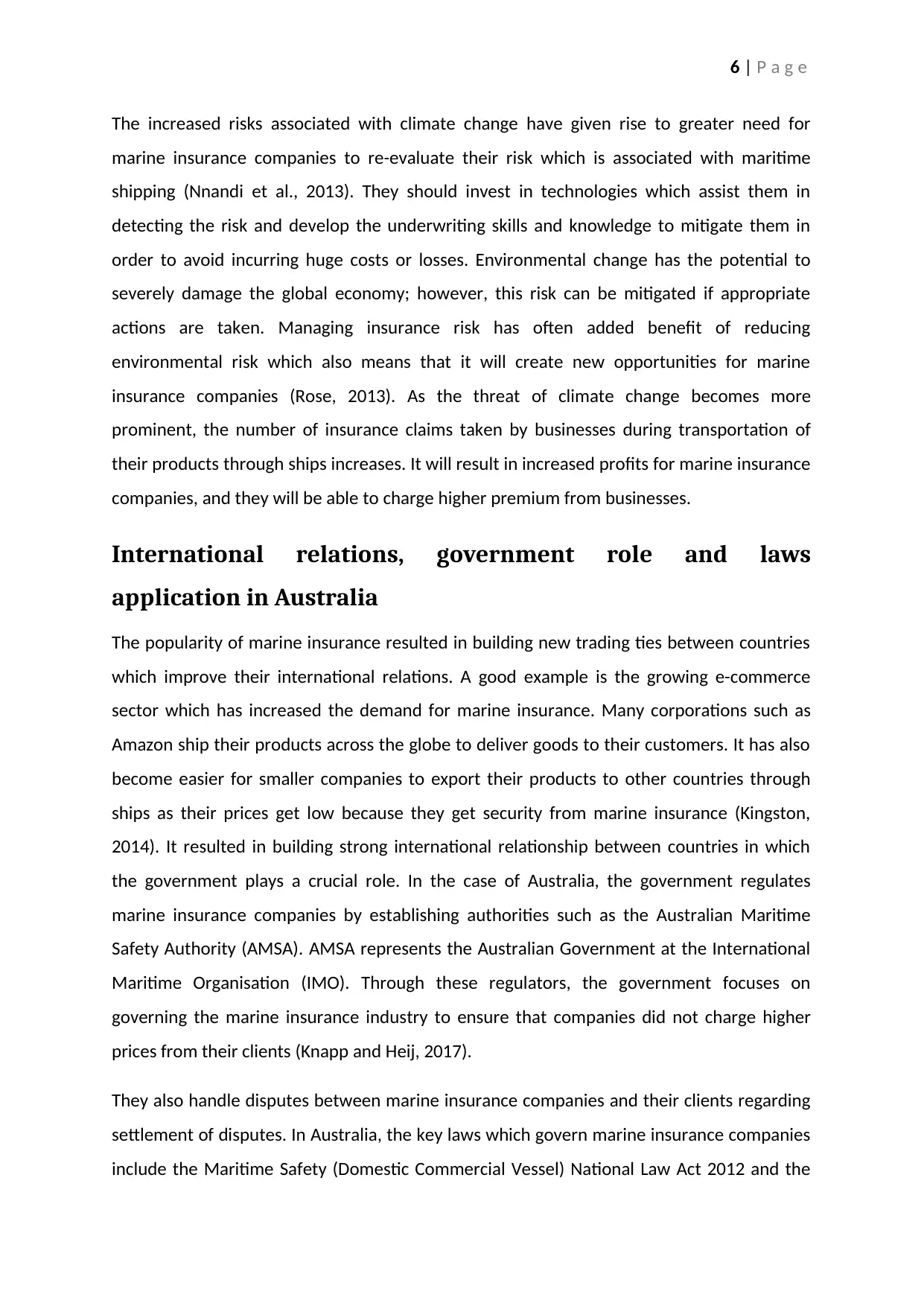
6 | P a g e
The increased risks associated with climate change have given rise to greater need for
marine insurance companies to re-evaluate their risk which is associated with maritime
shipping (Nnandi et al., 2013). They should invest in technologies which assist them in
detecting the risk and develop the underwriting skills and knowledge to mitigate them in
order to avoid incurring huge costs or losses. Environmental change has the potential to
severely damage the global economy; however, this risk can be mitigated if appropriate
actions are taken. Managing insurance risk has often added benefit of reducing
environmental risk which also means that it will create new opportunities for marine
insurance companies (Rose, 2013). As the threat of climate change becomes more
prominent, the number of insurance claims taken by businesses during transportation of
their products through ships increases. It will result in increased profits for marine insurance
companies, and they will be able to charge higher premium from businesses.
International relations, government role and laws
application in Australia
The popularity of marine insurance resulted in building new trading ties between countries
which improve their international relations. A good example is the growing e-commerce
sector which has increased the demand for marine insurance. Many corporations such as
Amazon ship their products across the globe to deliver goods to their customers. It has also
become easier for smaller companies to export their products to other countries through
ships as their prices get low because they get security from marine insurance (Kingston,
2014). It resulted in building strong international relationship between countries in which
the government plays a crucial role. In the case of Australia, the government regulates
marine insurance companies by establishing authorities such as the Australian Maritime
Safety Authority (AMSA). AMSA represents the Australian Government at the International
Maritime Organisation (IMO). Through these regulators, the government focuses on
governing the marine insurance industry to ensure that companies did not charge higher
prices from their clients (Knapp and Heij, 2017).
They also handle disputes between marine insurance companies and their clients regarding
settlement of disputes. In Australia, the key laws which govern marine insurance companies
include the Maritime Safety (Domestic Commercial Vessel) National Law Act 2012 and the
The increased risks associated with climate change have given rise to greater need for
marine insurance companies to re-evaluate their risk which is associated with maritime
shipping (Nnandi et al., 2013). They should invest in technologies which assist them in
detecting the risk and develop the underwriting skills and knowledge to mitigate them in
order to avoid incurring huge costs or losses. Environmental change has the potential to
severely damage the global economy; however, this risk can be mitigated if appropriate
actions are taken. Managing insurance risk has often added benefit of reducing
environmental risk which also means that it will create new opportunities for marine
insurance companies (Rose, 2013). As the threat of climate change becomes more
prominent, the number of insurance claims taken by businesses during transportation of
their products through ships increases. It will result in increased profits for marine insurance
companies, and they will be able to charge higher premium from businesses.
International relations, government role and laws
application in Australia
The popularity of marine insurance resulted in building new trading ties between countries
which improve their international relations. A good example is the growing e-commerce
sector which has increased the demand for marine insurance. Many corporations such as
Amazon ship their products across the globe to deliver goods to their customers. It has also
become easier for smaller companies to export their products to other countries through
ships as their prices get low because they get security from marine insurance (Kingston,
2014). It resulted in building strong international relationship between countries in which
the government plays a crucial role. In the case of Australia, the government regulates
marine insurance companies by establishing authorities such as the Australian Maritime
Safety Authority (AMSA). AMSA represents the Australian Government at the International
Maritime Organisation (IMO). Through these regulators, the government focuses on
governing the marine insurance industry to ensure that companies did not charge higher
prices from their clients (Knapp and Heij, 2017).
They also handle disputes between marine insurance companies and their clients regarding
settlement of disputes. In Australia, the key laws which govern marine insurance companies
include the Maritime Safety (Domestic Commercial Vessel) National Law Act 2012 and the
Paraphrase This Document
Need a fresh take? Get an instant paraphrase of this document with our AI Paraphraser
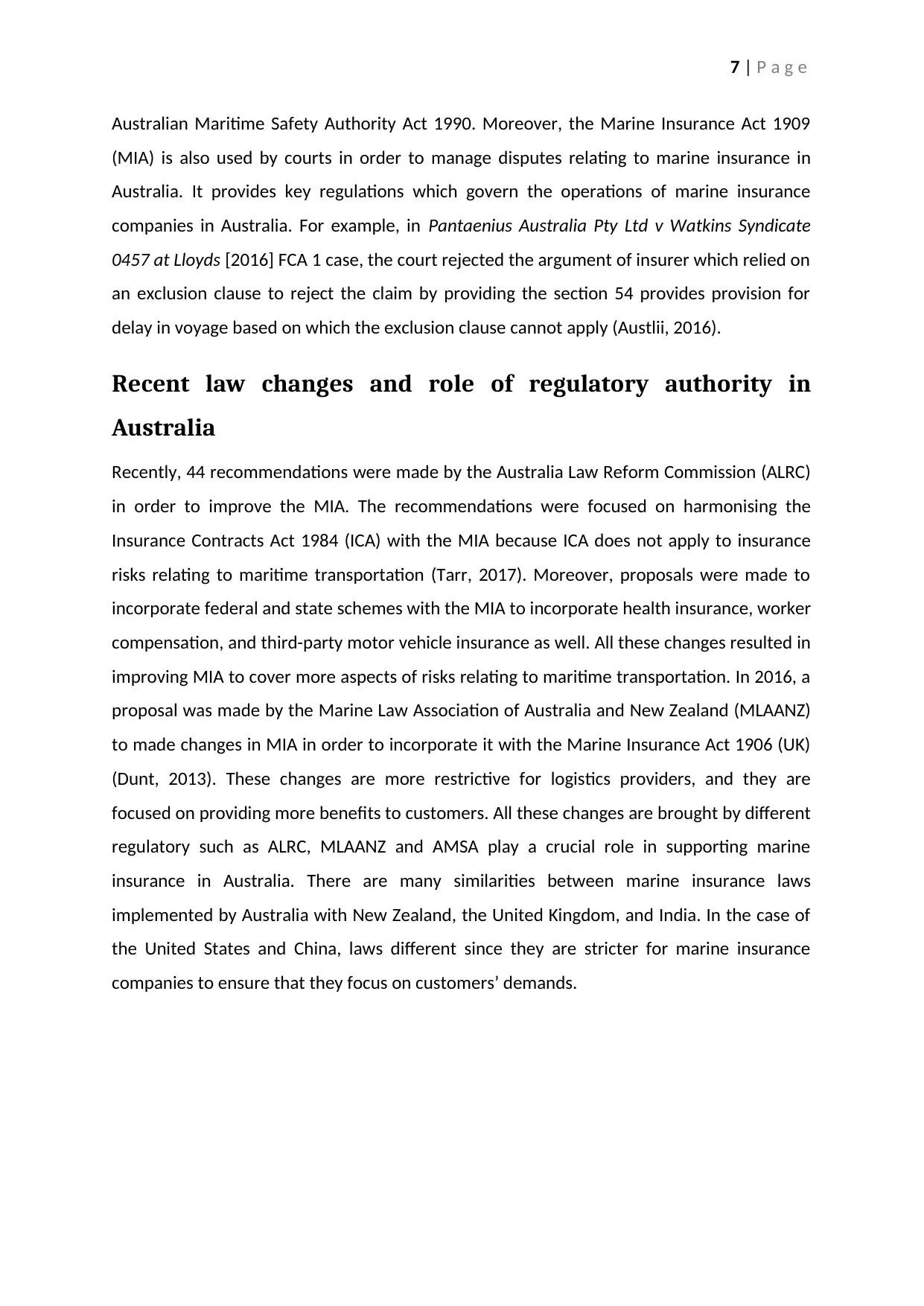
7 | P a g e
Australian Maritime Safety Authority Act 1990. Moreover, the Marine Insurance Act 1909
(MIA) is also used by courts in order to manage disputes relating to marine insurance in
Australia. It provides key regulations which govern the operations of marine insurance
companies in Australia. For example, in Pantaenius Australia Pty Ltd v Watkins Syndicate
0457 at Lloyds [2016] FCA 1 case, the court rejected the argument of insurer which relied on
an exclusion clause to reject the claim by providing the section 54 provides provision for
delay in voyage based on which the exclusion clause cannot apply (Austlii, 2016).
Recent law changes and role of regulatory authority in
Australia
Recently, 44 recommendations were made by the Australia Law Reform Commission (ALRC)
in order to improve the MIA. The recommendations were focused on harmonising the
Insurance Contracts Act 1984 (ICA) with the MIA because ICA does not apply to insurance
risks relating to maritime transportation (Tarr, 2017). Moreover, proposals were made to
incorporate federal and state schemes with the MIA to incorporate health insurance, worker
compensation, and third-party motor vehicle insurance as well. All these changes resulted in
improving MIA to cover more aspects of risks relating to maritime transportation. In 2016, a
proposal was made by the Marine Law Association of Australia and New Zealand (MLAANZ)
to made changes in MIA in order to incorporate it with the Marine Insurance Act 1906 (UK)
(Dunt, 2013). These changes are more restrictive for logistics providers, and they are
focused on providing more benefits to customers. All these changes are brought by different
regulatory such as ALRC, MLAANZ and AMSA play a crucial role in supporting marine
insurance in Australia. There are many similarities between marine insurance laws
implemented by Australia with New Zealand, the United Kingdom, and India. In the case of
the United States and China, laws different since they are stricter for marine insurance
companies to ensure that they focus on customers’ demands.
Australian Maritime Safety Authority Act 1990. Moreover, the Marine Insurance Act 1909
(MIA) is also used by courts in order to manage disputes relating to marine insurance in
Australia. It provides key regulations which govern the operations of marine insurance
companies in Australia. For example, in Pantaenius Australia Pty Ltd v Watkins Syndicate
0457 at Lloyds [2016] FCA 1 case, the court rejected the argument of insurer which relied on
an exclusion clause to reject the claim by providing the section 54 provides provision for
delay in voyage based on which the exclusion clause cannot apply (Austlii, 2016).
Recent law changes and role of regulatory authority in
Australia
Recently, 44 recommendations were made by the Australia Law Reform Commission (ALRC)
in order to improve the MIA. The recommendations were focused on harmonising the
Insurance Contracts Act 1984 (ICA) with the MIA because ICA does not apply to insurance
risks relating to maritime transportation (Tarr, 2017). Moreover, proposals were made to
incorporate federal and state schemes with the MIA to incorporate health insurance, worker
compensation, and third-party motor vehicle insurance as well. All these changes resulted in
improving MIA to cover more aspects of risks relating to maritime transportation. In 2016, a
proposal was made by the Marine Law Association of Australia and New Zealand (MLAANZ)
to made changes in MIA in order to incorporate it with the Marine Insurance Act 1906 (UK)
(Dunt, 2013). These changes are more restrictive for logistics providers, and they are
focused on providing more benefits to customers. All these changes are brought by different
regulatory such as ALRC, MLAANZ and AMSA play a crucial role in supporting marine
insurance in Australia. There are many similarities between marine insurance laws
implemented by Australia with New Zealand, the United Kingdom, and India. In the case of
the United States and China, laws different since they are stricter for marine insurance
companies to ensure that they focus on customers’ demands.
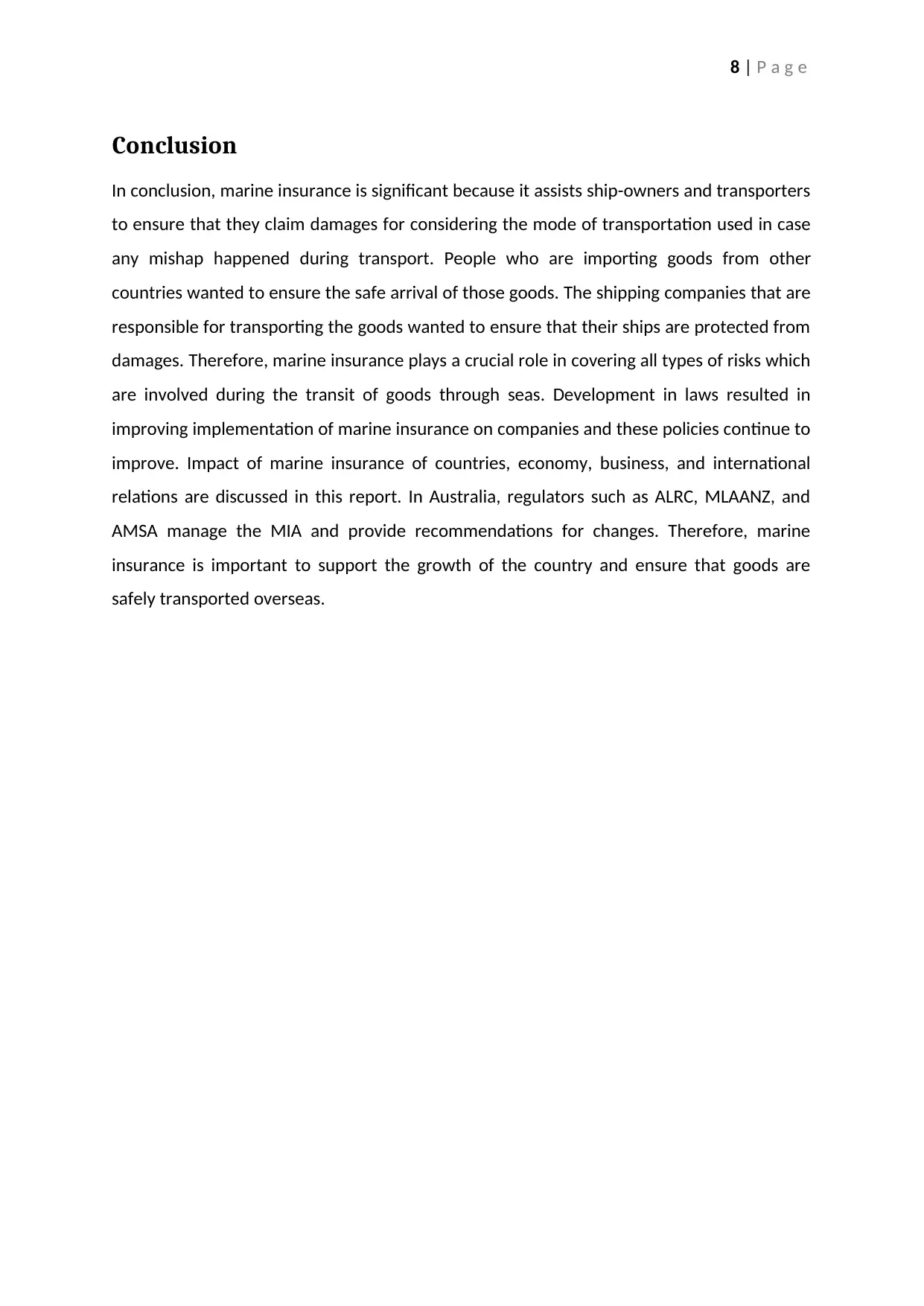
8 | P a g e
Conclusion
In conclusion, marine insurance is significant because it assists ship-owners and transporters
to ensure that they claim damages for considering the mode of transportation used in case
any mishap happened during transport. People who are importing goods from other
countries wanted to ensure the safe arrival of those goods. The shipping companies that are
responsible for transporting the goods wanted to ensure that their ships are protected from
damages. Therefore, marine insurance plays a crucial role in covering all types of risks which
are involved during the transit of goods through seas. Development in laws resulted in
improving implementation of marine insurance on companies and these policies continue to
improve. Impact of marine insurance of countries, economy, business, and international
relations are discussed in this report. In Australia, regulators such as ALRC, MLAANZ, and
AMSA manage the MIA and provide recommendations for changes. Therefore, marine
insurance is important to support the growth of the country and ensure that goods are
safely transported overseas.
Conclusion
In conclusion, marine insurance is significant because it assists ship-owners and transporters
to ensure that they claim damages for considering the mode of transportation used in case
any mishap happened during transport. People who are importing goods from other
countries wanted to ensure the safe arrival of those goods. The shipping companies that are
responsible for transporting the goods wanted to ensure that their ships are protected from
damages. Therefore, marine insurance plays a crucial role in covering all types of risks which
are involved during the transit of goods through seas. Development in laws resulted in
improving implementation of marine insurance on companies and these policies continue to
improve. Impact of marine insurance of countries, economy, business, and international
relations are discussed in this report. In Australia, regulators such as ALRC, MLAANZ, and
AMSA manage the MIA and provide recommendations for changes. Therefore, marine
insurance is important to support the growth of the country and ensure that goods are
safely transported overseas.
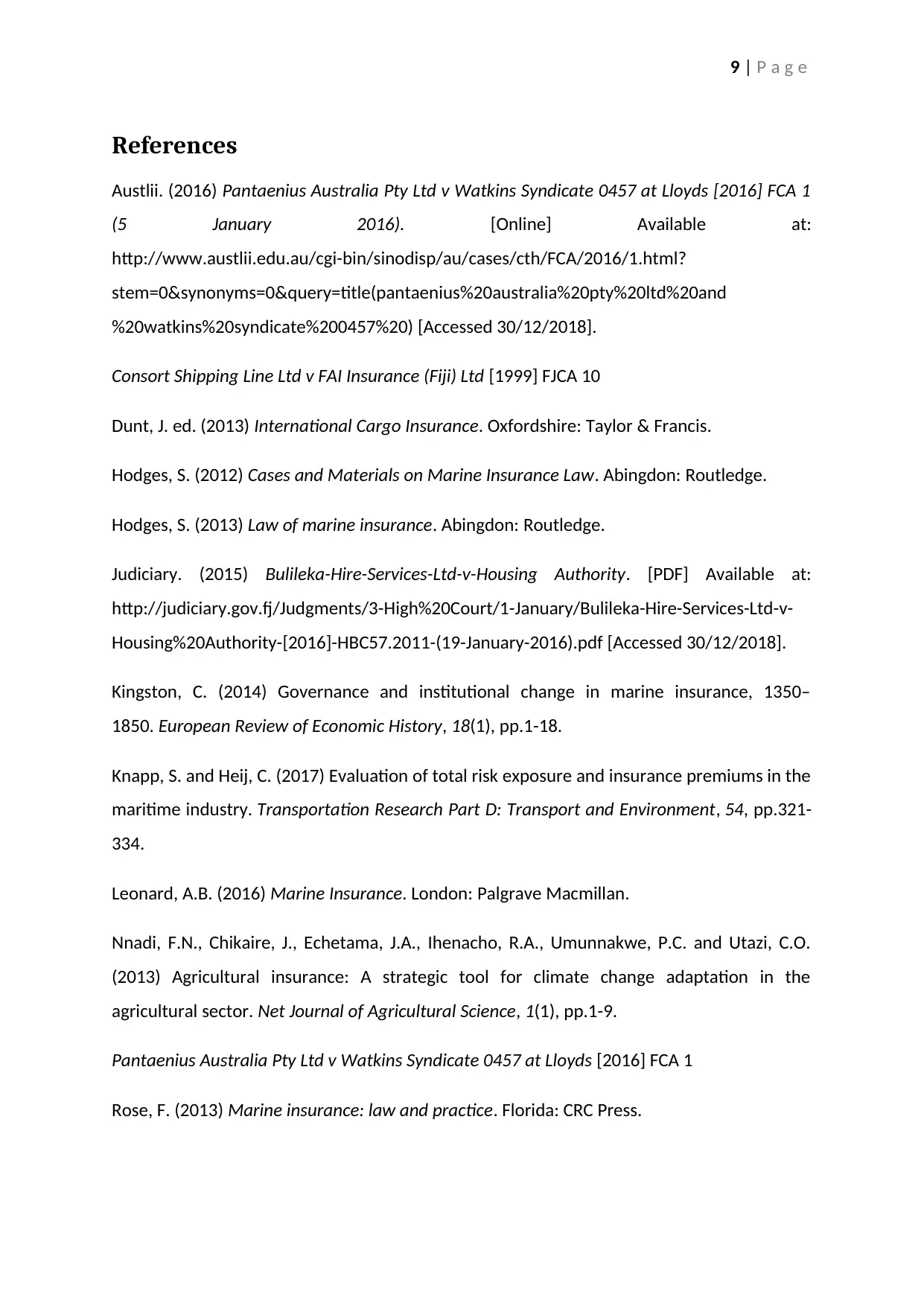
9 | P a g e
References
Austlii. (2016) Pantaenius Australia Pty Ltd v Watkins Syndicate 0457 at Lloyds [2016] FCA 1
(5 January 2016). [Online] Available at:
http://www.austlii.edu.au/cgi-bin/sinodisp/au/cases/cth/FCA/2016/1.html?
stem=0&synonyms=0&query=title(pantaenius%20australia%20pty%20ltd%20and
%20watkins%20syndicate%200457%20) [Accessed 30/12/2018].
Consort Shipping Line Ltd v FAI Insurance (Fiji) Ltd [1999] FJCA 10
Dunt, J. ed. (2013) International Cargo Insurance. Oxfordshire: Taylor & Francis.
Hodges, S. (2012) Cases and Materials on Marine Insurance Law. Abingdon: Routledge.
Hodges, S. (2013) Law of marine insurance. Abingdon: Routledge.
Judiciary. (2015) Bulileka-Hire-Services-Ltd-v-Housing Authority. [PDF] Available at:
http://judiciary.gov.fj/Judgments/3-High%20Court/1-January/Bulileka-Hire-Services-Ltd-v-
Housing%20Authority-[2016]-HBC57.2011-(19-January-2016).pdf [Accessed 30/12/2018].
Kingston, C. (2014) Governance and institutional change in marine insurance, 1350–
1850. European Review of Economic History, 18(1), pp.1-18.
Knapp, S. and Heij, C. (2017) Evaluation of total risk exposure and insurance premiums in the
maritime industry. Transportation Research Part D: Transport and Environment, 54, pp.321-
334.
Leonard, A.B. (2016) Marine Insurance. London: Palgrave Macmillan.
Nnadi, F.N., Chikaire, J., Echetama, J.A., Ihenacho, R.A., Umunnakwe, P.C. and Utazi, C.O.
(2013) Agricultural insurance: A strategic tool for climate change adaptation in the
agricultural sector. Net Journal of Agricultural Science, 1(1), pp.1-9.
Pantaenius Australia Pty Ltd v Watkins Syndicate 0457 at Lloyds [2016] FCA 1
Rose, F. (2013) Marine insurance: law and practice. Florida: CRC Press.
References
Austlii. (2016) Pantaenius Australia Pty Ltd v Watkins Syndicate 0457 at Lloyds [2016] FCA 1
(5 January 2016). [Online] Available at:
http://www.austlii.edu.au/cgi-bin/sinodisp/au/cases/cth/FCA/2016/1.html?
stem=0&synonyms=0&query=title(pantaenius%20australia%20pty%20ltd%20and
%20watkins%20syndicate%200457%20) [Accessed 30/12/2018].
Consort Shipping Line Ltd v FAI Insurance (Fiji) Ltd [1999] FJCA 10
Dunt, J. ed. (2013) International Cargo Insurance. Oxfordshire: Taylor & Francis.
Hodges, S. (2012) Cases and Materials on Marine Insurance Law. Abingdon: Routledge.
Hodges, S. (2013) Law of marine insurance. Abingdon: Routledge.
Judiciary. (2015) Bulileka-Hire-Services-Ltd-v-Housing Authority. [PDF] Available at:
http://judiciary.gov.fj/Judgments/3-High%20Court/1-January/Bulileka-Hire-Services-Ltd-v-
Housing%20Authority-[2016]-HBC57.2011-(19-January-2016).pdf [Accessed 30/12/2018].
Kingston, C. (2014) Governance and institutional change in marine insurance, 1350–
1850. European Review of Economic History, 18(1), pp.1-18.
Knapp, S. and Heij, C. (2017) Evaluation of total risk exposure and insurance premiums in the
maritime industry. Transportation Research Part D: Transport and Environment, 54, pp.321-
334.
Leonard, A.B. (2016) Marine Insurance. London: Palgrave Macmillan.
Nnadi, F.N., Chikaire, J., Echetama, J.A., Ihenacho, R.A., Umunnakwe, P.C. and Utazi, C.O.
(2013) Agricultural insurance: A strategic tool for climate change adaptation in the
agricultural sector. Net Journal of Agricultural Science, 1(1), pp.1-9.
Pantaenius Australia Pty Ltd v Watkins Syndicate 0457 at Lloyds [2016] FCA 1
Rose, F. (2013) Marine insurance: law and practice. Florida: CRC Press.
Secure Best Marks with AI Grader
Need help grading? Try our AI Grader for instant feedback on your assignments.
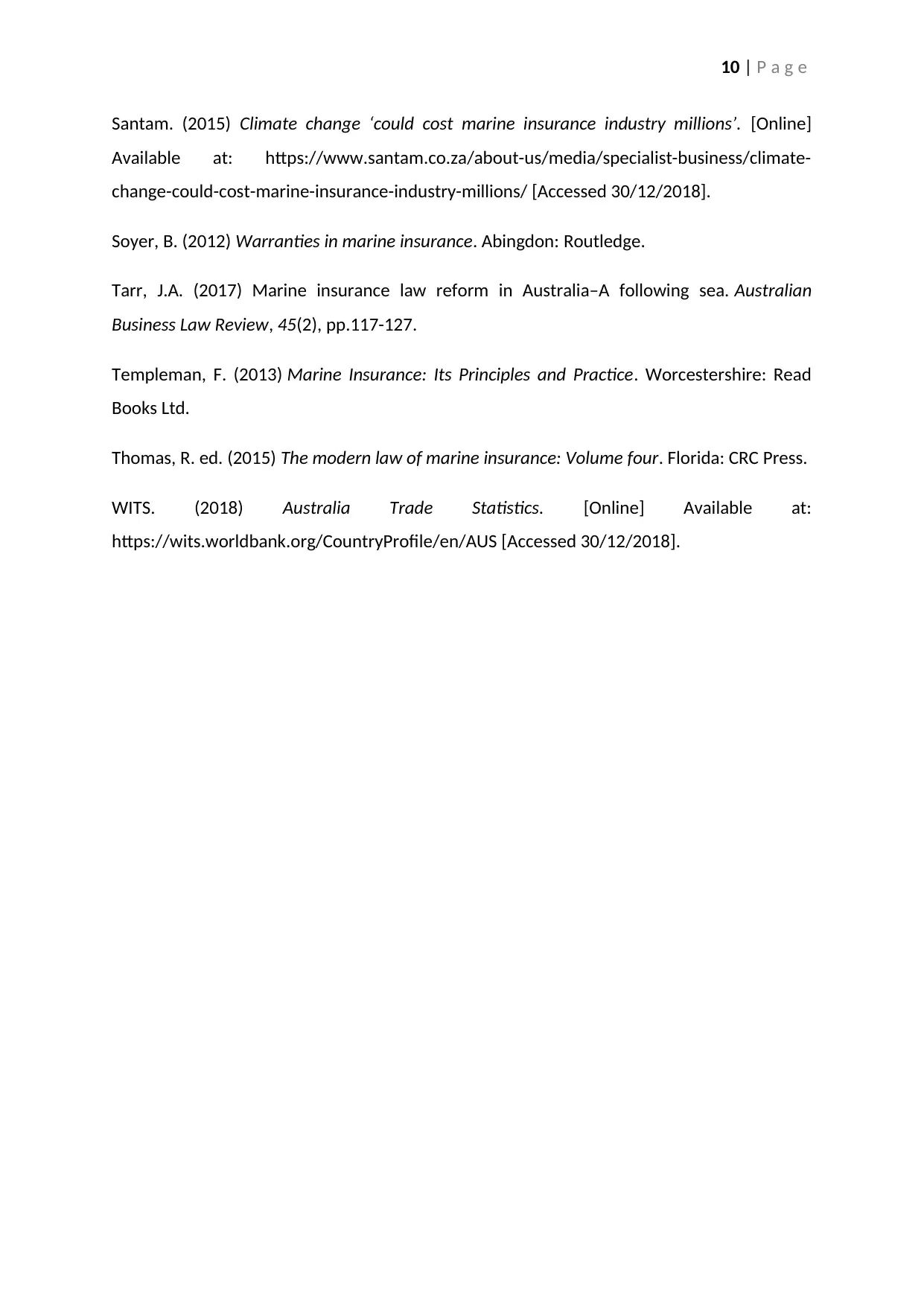
10 | P a g e
Santam. (2015) Climate change ‘could cost marine insurance industry millions’. [Online]
Available at: https://www.santam.co.za/about-us/media/specialist-business/climate-
change-could-cost-marine-insurance-industry-millions/ [Accessed 30/12/2018].
Soyer, B. (2012) Warranties in marine insurance. Abingdon: Routledge.
Tarr, J.A. (2017) Marine insurance law reform in Australia–A following sea. Australian
Business Law Review, 45(2), pp.117-127.
Templeman, F. (2013) Marine Insurance: Its Principles and Practice. Worcestershire: Read
Books Ltd.
Thomas, R. ed. (2015) The modern law of marine insurance: Volume four. Florida: CRC Press.
WITS. (2018) Australia Trade Statistics. [Online] Available at:
https://wits.worldbank.org/CountryProfile/en/AUS [Accessed 30/12/2018].
Santam. (2015) Climate change ‘could cost marine insurance industry millions’. [Online]
Available at: https://www.santam.co.za/about-us/media/specialist-business/climate-
change-could-cost-marine-insurance-industry-millions/ [Accessed 30/12/2018].
Soyer, B. (2012) Warranties in marine insurance. Abingdon: Routledge.
Tarr, J.A. (2017) Marine insurance law reform in Australia–A following sea. Australian
Business Law Review, 45(2), pp.117-127.
Templeman, F. (2013) Marine Insurance: Its Principles and Practice. Worcestershire: Read
Books Ltd.
Thomas, R. ed. (2015) The modern law of marine insurance: Volume four. Florida: CRC Press.
WITS. (2018) Australia Trade Statistics. [Online] Available at:
https://wits.worldbank.org/CountryProfile/en/AUS [Accessed 30/12/2018].
1 out of 11
Related Documents
Your All-in-One AI-Powered Toolkit for Academic Success.
+13062052269
info@desklib.com
Available 24*7 on WhatsApp / Email
![[object Object]](/_next/static/media/star-bottom.7253800d.svg)
Unlock your academic potential
© 2024 | Zucol Services PVT LTD | All rights reserved.





